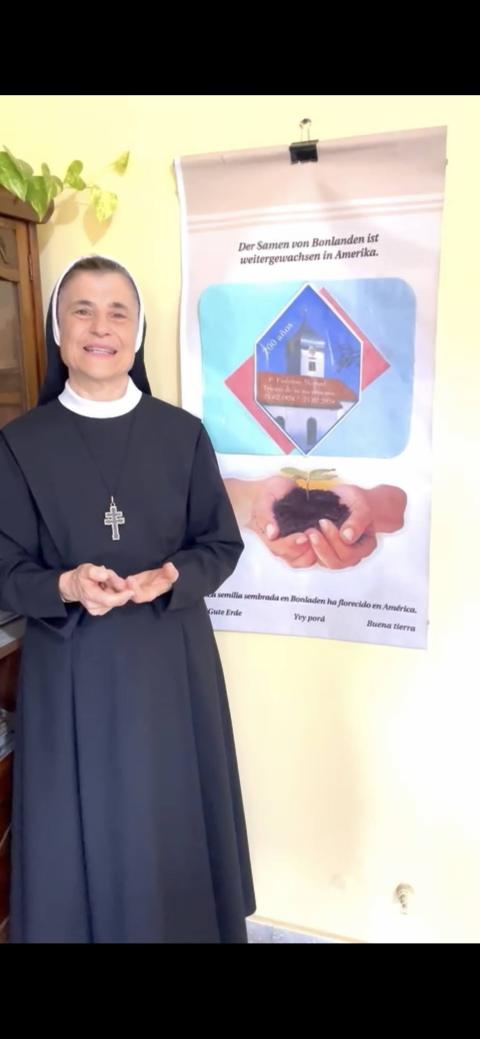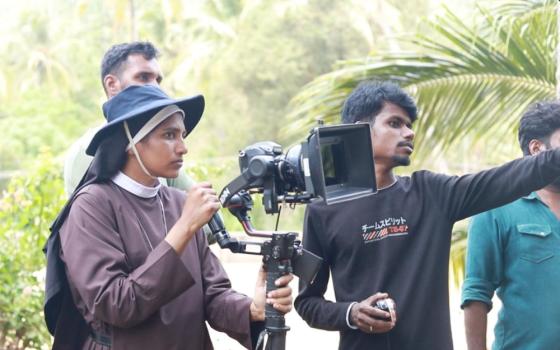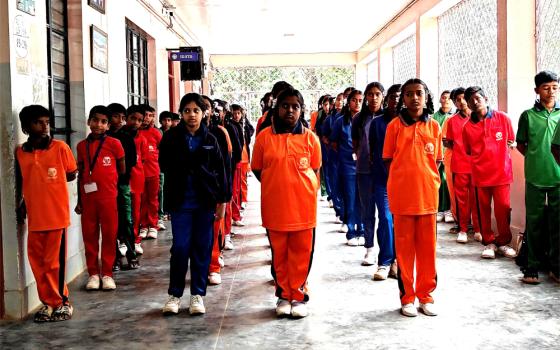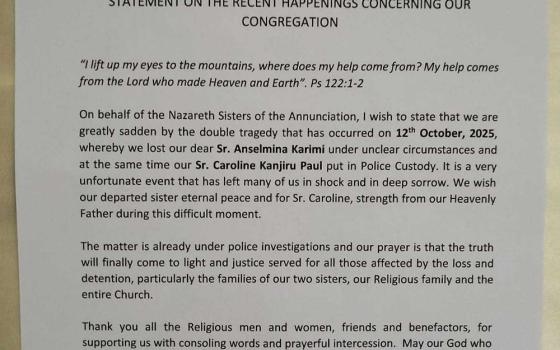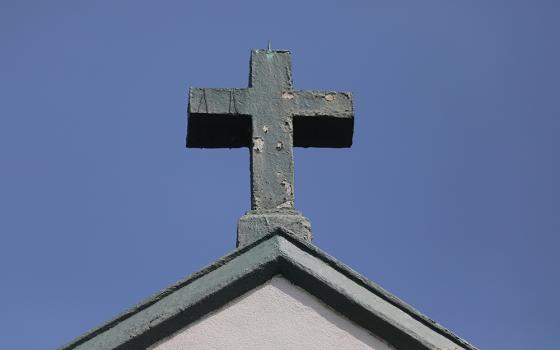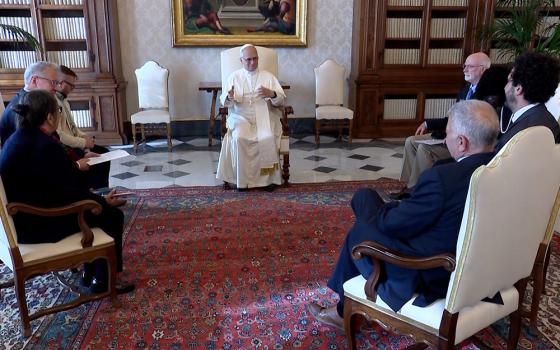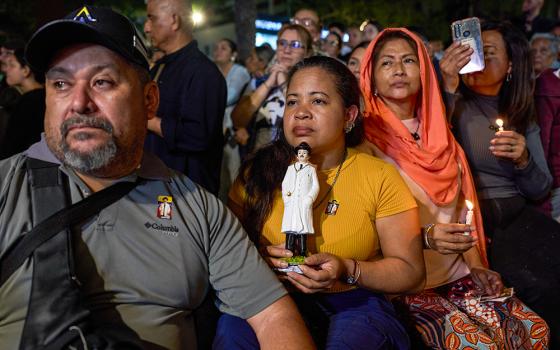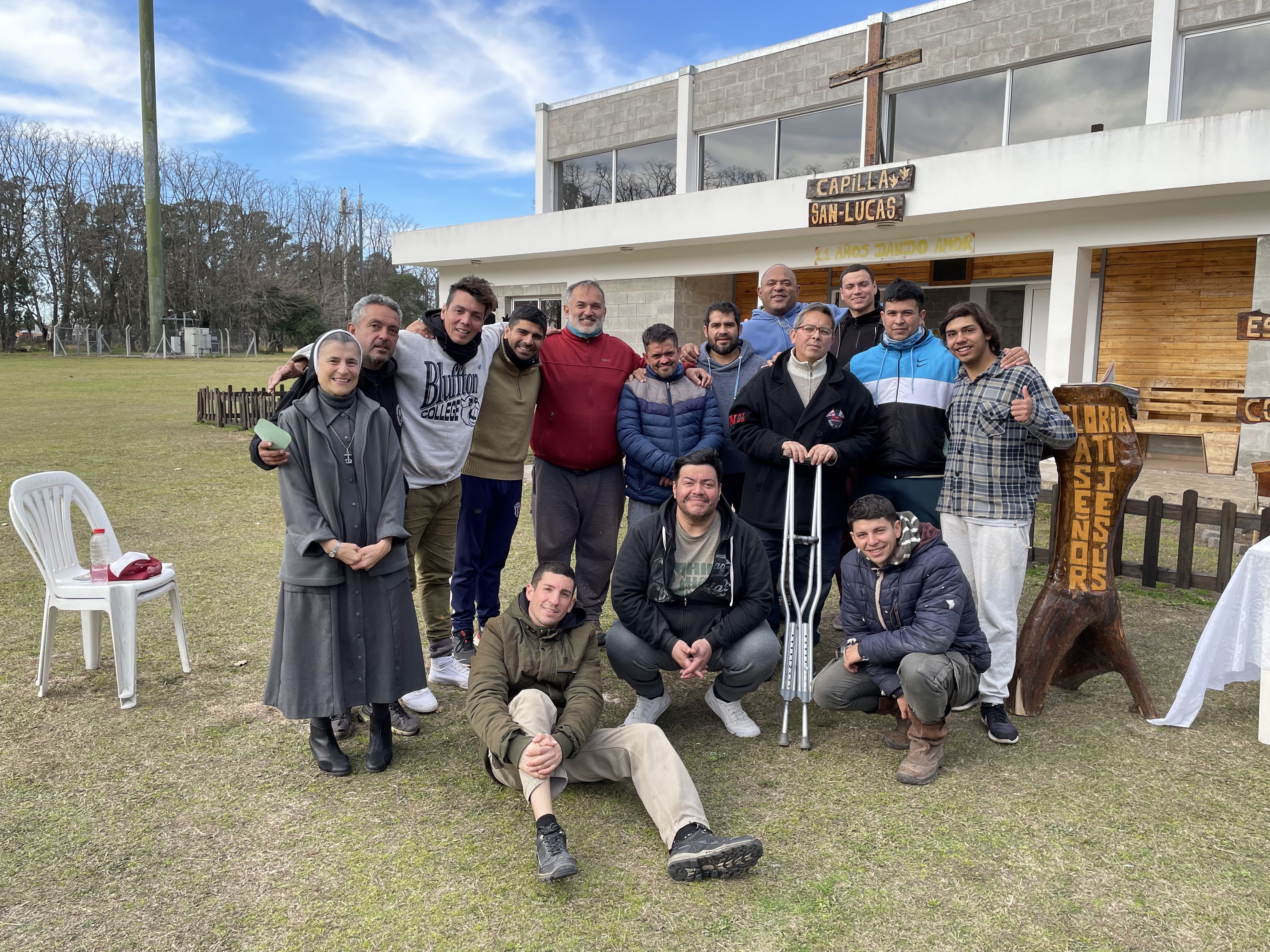
Sr. Graciela Trivilino (left), a Franciscan of the Immaculate Conception of María de Bonlanden, at Florencio Varela's Fazenda da Esperanza in Buenos Aires, Argentina, where she, other sisters and volunteers receive, accompany and rehabilitate young people and adults with addictions. (Courtesy of Graciela Trivilino)
Since Sr. Graciela Trivilino decided on her vocation to serve those most in need, her work as head of "Familia de la Esperanza" (Family of Hope) has helped many people get out of the world of drugs and choose a path of peace and harmony.
Pedro (a pseudonym) is a testimony to how the power of the word and understanding others can help achieve radical changes in those who believe they have lost everything. "I had two paths: Either I came here, or I'd give up," he had confessed to Trvilino upon meeting her.
For 12 years, the Franciscans of the Immaculate Conception of María de Bonlanden have been carrying out their ministry in the Florencio Varela neighborhood in Buenos Aires, Argentina. This ministry requires a capacity for deep listening and closeness, so that those who go through this process feel truly accompanied and thus recover their lives.
This year, Trivilino celebrates 40 years of religious life, and today she is the general superior of the congregation in the region, with a long history of serving the recovery of people with addiction.
She works exclusively with men in this place, which can accommodate up to 30 inmates at a time, with their ages ranging from 14 years to elderly. So far, about 800 people have passed through their doors.
According to the latest report from the United Nations Office on Drugs and Crime, among Latin American countries, cocaine use in Argentina has grown the most in recent years, where there's a high prevalence of drug use in the context of Latin America and the world.
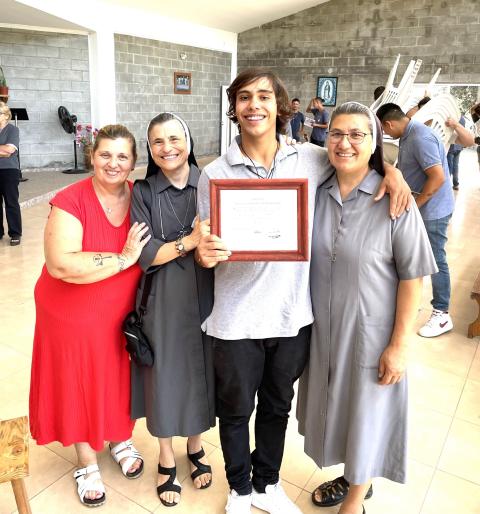
Sr. Graciela Trivilino, second from left, with one of the young adults who recovered at the fazenda, as he receives a diploma to become an "Ambassador of Hope" (Courtesy of Graciela Trivilino)
In this context, Trivilino, along with the work of other sisters and volunteers, is at the forefront of the Family of Hope, where they receive, accompany, and rehabilitate young people and adults to overcome the scourge of drugs.
In a conversation with Global Sisters Report, Trivilino opened her doors to talk about the work she does and how it opened her eyes to a "new world" unknown to her.
How did the decision come about to open this center focused on addictions?
Family of Hope was born 40 years ago in Guaratinguetá, Brazil. Through time this initiative was expanded and reached the ears of the Diocese of Quilmes [to which Florencio Varela belongs], where Bishop Luis Stöckler – together with Fr. Armando Dessy – made their way with the founders of Family of Hope to open a "Fazenda da Esperanza" in the Santa Rosa neighborhood.
Bishop Luis Stöckler asked the provincial superior of the Franciscan Sisters of Bonlanden if they could collaborate in the upcoming project, and that is how one sister got started, and then other sisters continued to help. This led us to the need to train ourselves in diocesan matters, as well as in Brazil. This challenge presented to us by the Lord Jesus was a new awakening in my religious life.
'We work on three pillars: spirituality, coexistence and work.'
—Sr. Graciela Trivilino
What kind of tasks do you do together with the inmates at the fazenda?
We work on three pillars: spirituality, coexistence and work. It should be noted that in this center there is no medication or psychologists. I have accompanied young men to the psychiatrist, but with the consent of those responsible. Here they are given very special training.
Each person who decides to enter the fazenda does so for a whole year. At the beginning we dedicate ourselves mainly to listening, which consists of a plan over time with each of the young people who are admitted. Boys with a lot of varied histories attend here, some who went to court, and others who come from prisons to finish their sentences here. As a consequence, I ended up doing an activity that I had never imagined: helping inmates to contact their lawyers and judges.
Integral work implies taking care of the whole person, listening to him, giving him a handkerchief when he cries, because one's heart must be open to heal the wounds. It is like opening a can of treasures that was closed for a long time and where everything was mixed, so that a new being emerges. I could say that with this experience I saw another facet of life.
I always say that respect is the most important thing when we work with them. At first, we try to speak as little as possible, to receive the person as they come. This listening work led me to develop different techniques to achieve a better approach with patients. One of them: introduce myself as part of a pair.
How was this work during the time of the pandemic, when the Argentine government forbade nonessential workers from leaving their homes?
In this period, I took part in the "Pastoral Network of Listening" from the Diocese of Quilmes to help those who asked for help of any kind. In the first year of the pandemic, we couldn't receive any new inmates, and that's why we put together a diocesan phone network with our numbers and names posted anywhere, even on street fences. I remember that the first call I received was from the province of Salta [in northern Argentina] by an addict, and we began to create networks so that he could be hospitalized.
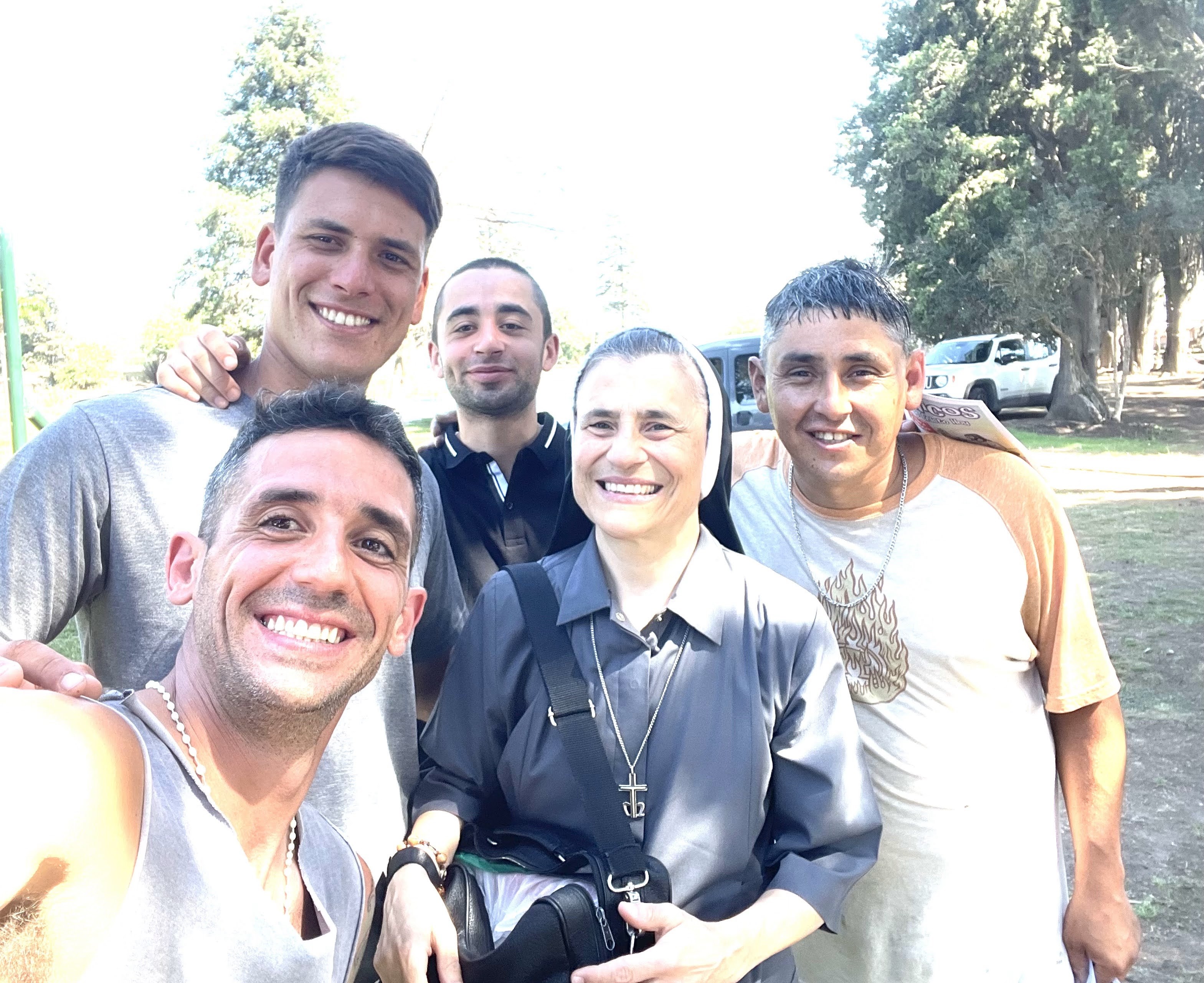
Sr. Graciela Trivilino with residents of the Fazenda da Esperanza, after a day of activities (Courtesy of Graciela Trivilino)
What happens to those who have recovered?
Many people, once the year ends at the fazenda, are sent as "ambassadors of hope." Here, we give them a small diploma where we state their recovery and organize a little party for their graduation. This concept of "ambassadors" was taken from Pope Benedict XVI, who visited the farm in Brazil and where he mentioned that term. I formed the Living Hope Group in our school, which are the groups that arise to accompany the recovered, who usually meet in a chapel to accompany them in their perseverance and share the word.
There are some who persevere, and there are also others who relapse and go back to the hospital. Many times, it is due to the environment, that when they return to their places of origin, they find themselves in very difficult contexts to reintegrate. That is why many choose to go to other places where they can live the fazenda lifestyle.
This year, you celebrate 40 years of service as a woman religious. What reflections can you share with us about your work?
First of all, I want to emphasize the mercy of God. I was a teenager very dedicated to social work and helping those most in need, but at the same time, I was very rebellious. I always said in front of my friends that I wanted to be a missionary in Africa, not here. But once entering the postulancy, I had to stay in Florencio Varela, and over time I realized that the mission does not pass through a specific place but through an attitude of the heart.
It was as if God told me, "Stay in Varela, and I'll send you the people." The Lord took me through my religious life to those places to which I thought that, in order to live an experience as a consecrated, I had to go far away. What the Lord taught me is that if you are willing to serve him, he will show you the places.
I can summarize my experience in the biblical quote that I chose when I made my consecration: "I can do all things for those who comfort me" (Philippians 4:13). I feel that the Lord does not allow himself to be outdone in generosity, because sometimes I would go to the farm feeling tired and come back with more energy than I had before. At times, I found myself wondering, why is it that I am so happy? And I associate it with this other quote from Matthew 25: "I was sick and you visited me."
My community and my congregation are my family and from the gift of the charism: "Serving God in spirit and truth." We feel called to discover the face of God in the services to which he sends us.
This Q&A was originally published in Spanish on Aug. 10, 2023.

